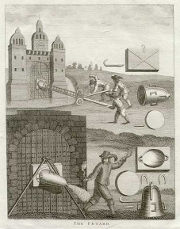|
Home
|
Sep 30, 2013
This week's themeFossil words This week's words petard druthers dudgeon caboodle shrift 
Illustration from the book Military Antiquities Respecting a History of The English Army from Conquest to the Present Time by Francis Grose Esquire, 1812
A.Word.A.Day
with Anu GargWhat comes to your mind if I say the name Dumpty? Perhaps you're thinking of Humpty and you'd be right. The two go together. Each of this week's words also prefers specific company, and usually appears in set expressions. You can also think of them as fossil words. They are mostly obsolete and only appear as part of idioms. We are used to seeing them bundled and never stop to think about what they literally mean. This week we'll go behind the scenes to identify their origins. petard
PRONUNCIATION:
MEANING:
noun: 1. A small bomb used to blast down a gate or wall. 2. A loud firecracker. ETYMOLOGY:
From French péter (to break wind), from Latin peditum (a breaking wind),
from pedere (to break wind). Ultimately from the Indo-European root pezd-
(to break wind) which also gave us feisty, fart, and French pet (fart).
Earliest documented use: 1566.
NOTES:
A petard was a bell-shaped bomb used to breach a door or a wall.
Now that we have advanced to ICBMs, this low-tech word survives in the
phrase "to be hoist by one's own petard" meaning "to have one's scheme
backfire". The idiom was popularized by Shakespeare in his play Hamlet.
Hamlet, having turned the tables on those tasked with killing him, says: For 'tis the sport to have the engineer Hoist with his own petard USAGE:
"Her attempt to rub salt in the wound had backfired. She had been well
and truly hoist by her own petard." Immodesty Blaize; Ambition; Ebury Press; 2010. "Ned ... heard the petard exploding against the doors of the fort." Dudley Pope; Corsair; House of Stratus; 1987. See more usage examples of petard in Vocabulary.com's dictionary. A THOUGHT FOR TODAY:
Ultimately, the only power to which man should aspire is that which he exercises over himself. -Elie Wiesel, writer, Nobel laureate (b. 1928)
|
|
Subscriber Services
Awards | Stats | Links | Privacy Policy
Contribute | Advertise
Awards | Stats | Links | Privacy Policy
Contribute | Advertise
© 1994-2026 Wordsmith